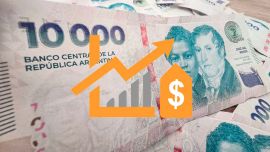Argentina and the International Monetary Fund have reached an understanding on when the nation will achieve a balanced primary budget, marking a first key step to renegotiating more than US$40 billion of debt, according to people familiar with the talks.
The agreement comes after talks intensified in the past week following months of delays, and Argentina plans to make a payment of more than US$700 million due on Friday, the people said, asking not to be named without permission to speak publicly. The parties have agreed for the country to reach a balanced primary budget – that is, a budget without including interest payments – in 2025, one of the people said.
The nation’s Economy Ministry and IMF staff are expected to continue discussing details of the programme, the people said.
Argentina’s Economy Ministry didn’t immediately return a message seeking comment after normal business hours on Thursday. IMF spokesman Gerry Rice declined to comment.
IMF staff plan to brief the lender’s board of directors on the state of negotiations in an informal meeting on Friday morning in Washington, according to a person with direct knowledge of the matter.
Reaching a balanced primary budget in 2025 would be a concession from Argentina’s public negotiating stance after Economy Minister Martín Guzmán said earlier this month that he wanted to wait until 2027 to close the deficit.
Argentina has been pursuing a deal, the nation’s 22nd with the IMF, to postpone payments of over US$40 billion of outstanding debt with the Washington-based organisation stemming from a record bailout given to the previous government in 2018. The country is aiming to negotiate with the IMF a 10-year deal, known as an extended fund facility, that would give the country at least a four-and-a-half year grace period before starting to pay back its debt.
The agreement on the fiscal path also provides the first framework of an economic plan under President Alberto Fernández, who has opted to govern through a patchwork of short-term policies.
An eventual full programme, following a staff-level agreement, would need to be approved by Argentina’s Congress and the IMF board. Approval isn’t guaranteed on the Argentine side, given that Fernandez’s 2022 budget proposal was voted down in December by a new congress. His ruling coalition lost its Senate majority after being defeated in November’s midterm elections.
Argentina also would need to abide by the budget targets in the program and pass quarterly reviews with IMF staff in order to keep receiving debt relief. That’s a difficult task with next year’s presidential election, and a ruling coalition divided after its loss in the midterms.
related news
by Jorgelina do Rosario, Eric Martin & Patrick Gillespie, Bloomberg























Comments